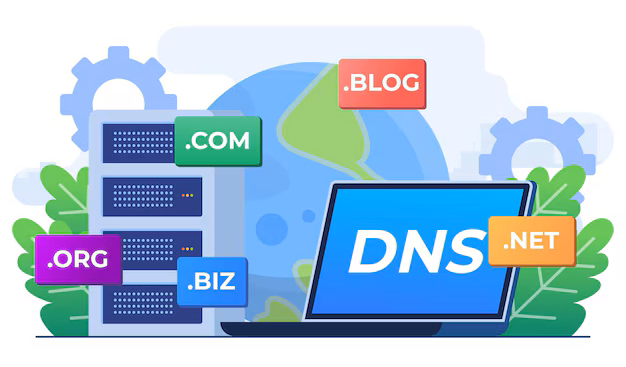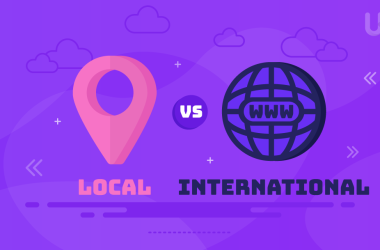The first step in building a solid e-commerce store is choosing a domain name that aligns perfectly with your brand and target audience. The domain name of your store is no doubt a critical asset. It is an integral part of your brand and the key to your marketing success. It is also the identity of your online store, the first impression of the customer, and the main element of your brand.
Here in this article, we are going to discuss about the best domain names for an ecommerce store considering domain extension, branding tips and seo impact.
Why Your Domain Matters in E-commerce

The domain name is not a mere collection of characters. The domain name has marketing and branding power. Upon seeing your domain name, the users immediately decide whether your business is good or bad. A good domain can help build trust, increase click-through rates, and even be a part of your SEO strategy.
Where the competition is tight, a domain on the side of e-commerce can be like a sign for your digital storefront. It should be clear, credible, and easy to remember. A domain that is incomprehensible or wrongly picked can cause a loss of visitors, decrease of sales and create a weak brand identity.
The Key Qualities of a Great E-commerce Domain
Before we get into the different domain extensions or some naming ideas, let us have a look at the main characteristics that make a domain suitable for e-commerce:
Easy to Remember
Simplicity is the key here. You definitely want your customers to be able to recall your domain even after they have visited other websites. Short, snappy and meaningful names are the most memorable.
Easy to Type and Pronounce
Words that are tricky to spell or names that are difficult to pronounce may confuse the users. If your clients can’t write your domain name properly, they probably won’t even try to find your store.
Brandable
Your domain name should be a reflection of your brand personality. It should be different and trigger some feeling from the product or the values that come to mind when thinking about it.
Relevant to Your Niche
Domains that are associated with your niche or product category make things easier for the customers. They help them immediately recognize what you are offering.
Trustworthy
A name which has a professional look will definitely win the trust of potential customers. Such trust can be especially crucial when we talk about e-commerce, where a good decision of purchase security is a must.
Choosing the Best Domain Extension for E-commerce

The domain extension is the part of the name that follows the dot, such as .com or .store. Most people fail to realize the importance of domain extensions but the role they play in branding and trust is vital.
The following are some of the best domain extensions for e-commerce and also the best domain for Shopify:
.com – The Most Popular and Trusted
The .com extension is the most widely and trusted domain extension across the globe. Clients practically have the habit of assuming that most of the sites end with .com, hence, the easiest to remember.
If you manage to get a .com that is the same as your brand or product, it’s generally the safest bet. This is particularly crucial if you are thinking of expanding your store or creating a brand online that people will recognize in the future.
.store – Purpose-Built for Ecommerce
The .store domain is specifically for online shops and e-commerce websites. It is direct and unambiguous in telling users that you have some products to sell. The .store domain is not as popular as .com, but it is becoming more e-commerce-friendly.
.store offers a benefit in terms of availability. Brandable best domain names that are taken in .com might still be open in .store. This gives you more room to choose a name for your business.
.shop – Another Ecommerce-Friendly Option
Similar to .store, the .shop extension signifies an online retail business. It is straightforward, concise, and can be utilized worldwide. Besides, it also provides more availability than .com domains.
If you deal with a general product store or a boutique with multiple categories, .shop can be the perfect match.
Country-Specific Extensions – Great for Local Stores
When your ecommerce store is specifically meant for clients residing in a certain country, it would be wise to use a country code extension such as .uk (United Kingdom), .ca (Canada), or .com.au (Australia). Such extensions will generate more local trust and might also help you in your local search rankings.
On the other hand, remember that country extensions may restrict your global expansion with the same domain.
New Generic Extensions (.xyz, .online, etc.)
Innovative and trendy new extensions such as .xyz domain or .online domain do not necessarily match an online retail business. In the eyes of some customers, these domains might be strange or less trustworthy.
If you decide on also a new extension, make sure it is accompanied with strong branding and good customer experience so that you will be able to establish trust with your customers over time.
Thinking About Your Store’s Domain?
The right name makes a big difference. If you’re running an online shop, a Ultahost’s .store domain just makes sense. It’s clear, simple, and instantly tells people what you do. Want something that feels made for ecommerce? Take a closer look at .store and see if it’s the right match for your business goals.
How to Pick the Right Domain Name for Your Shop
Since you know what the important things are, let’s discuss the steps to take when selecting a good domain name for your online store.
Brainstorm Keywords and Concepts
Your first step should be taking words that are associated with your niche, product, audience, or brand story. Use tools like:
- Google Keyword Planner
- Shopify’s Business Name Generator
- Namecheap’s domain search tool
- BigCommerce’s domain setup guide if you’re looking to connect a BigCommerce domain
Come up with descriptive, action-oriented, or emotional words that establish a connection with your target audience.
Keep It Short and Sweet
Shorter domains are more memorable and also look better on social media, emails, and business cards. You should aim for one to two words if possible.
For instance:
- FreshThreads.com
- Glowshop.store
- PlantNest.shop
Avoid Numbers and Hyphens
Domains with numbers and/or hyphens are less memorable and more difficult to type. For example, my-shoe-store123.com is unclean and unprofessional. A clean and direct domain is more effective.
Check for Trademarks
Ensure that the name of your domain does not violate any trademarks. Access the United States Patent and Trademark Office (USPTO) database or use a local trademark checker to be on the safe side. This will save you from possible legal issues in the future.
Before you decide on a domain, confirm that you can use the same username on the different social media platforms (Instagram, Facebook, TikTok) to maintain consistent branding, which will make you more recognizable.
Register Quickly
Good domains are usually gone in the blink of an eye. The moment you decide on a suitable name, don’t hesitate to register it immediately. A reputable registrar such as Namecheap, GoDaddy, or Google Domains is a good choice.
Mistakes to Avoid When Choosing an E-commerce Domain
Common mistakes can be made even with a good strategy, and they might drag down the success of your online store. Some of those pitfalls to avoid are:
Using Long, Complicated Names
Domains with too many words or syllables were definitely a big problem in the past. They are difficult to remember. Customers can not only forget your store, but also enter the wrong name.
Copying Another Brand
Trying to be like a successful brand in name or style might turn out to be a disaster with your credibility. Rather than that, create your own unique identity.
Choosing a Domain with Negative Meanings
Always run basic checks to see if the domain is used in a different language, and additionally, cultural contexts should be considered. A word that is perfect in one language could turn out to be a negative or offensive term in another language.
Ignoring SEO
Search engines indeed consider domain names in their ranking process. If your domain name naturally includes a relevant keyword (not excessively), it may help your site rank better.
Such as if your goods are organic teas, a domain of “PureLeafTeas.com” could be a good SEO decision.
Failing to Think Long-Term
Don’t get stuck only with one item in case you want to widen your business in the future. An example of this would be “BestYogaMats.com” which suits only if you sell exclusively yoga mats but if you decide to add yoga clothes or accessories later, it won’t
Premium domains are those that have been registered in the past and their owners are looking to resell them usually at a high price. Such domains are generally short, catchy, and very popular.
- Built-in trust and credibility
- Memorable and easy to type
- Can give you a head start in SEO
Cons:
- Higher cost
- Not always worth the price for new businesses
In case your business plan is sound and your budget is sufficient, purchasing a premium domain could prove to be a clever move. Otherwise, just concentrate on finding a new name that is creative and suits your brand vision.
Final Tips for Building a Strong Domain Strategy
You’ve pretty much picked your domain and now there are only a couple of things you can do to protect and scale your brand further:
- Get your domain’s most commonly misspelled names to be sure that nobody is losing you due to that.
- If you want to make sure that your competitors cannot steal domains that are similar to yours, then you can register other extensions such as .net, .shop, etc.
- You can also redirect all the other domain names that you have registered to the one that you use the most by setting up domain forwarding.
- Get an SSL certificate for your domain and use HTTPS, this way you will be able to build trust as well as being compliant with the data protection laws.
Conclusion
The perfect domain for your e-commerce store is one that customers will find easy to remember, is relevant, and reflects your brand.
Although .com is still dominant, new domain extensions like .store, or .shop bring a certain commonality and some flexibility with them. When choosing a domain name, concentrate on being short, clear, and having good branding potential. Do not use absurdly long or complicated words. Additionally, it is a good idea to check for trademark infringement and take care of securing your social media accounts at the very beginning of the process.
If you are starting your first online store or are about to change the brand of your existing one, your domain name can be decisive to the experience. Spend enough time choosing and be sure to set up your e-commerce business for success from the very first day.
If you’re setting up an online store, having a secure and steady hosting setup matters a lot. UltaHost’s eCommerce Hosting gives you fast speeds, daily backups, and strong protection from online threats. It even comes with a free SSL to keep your customers safe. For anyone serious about their ecommerce business in 2025, it’s worth checking out.
FAQ
What is the best domain extension for ecommerce?
The .com extension is the most trusted, but .store and .shop are also great choices for ecommerce websites.
Is .store a good domain for online shops?
Yes, .store is designed specifically for ecommerce businesses and clearly tells customers you’re running an online store.
Should I choose a short domain name for my store?
Yes, short and simple domain names are easier to remember and type, which helps improve branding and user experience.
Can a domain name help with SEO?
A relevant domain name can slightly improve SEO, especially if it naturally includes a keyword related to your niche.
How do I know if a domain is brandable?
A brandable domain is unique, easy to pronounce, and reflects your business’s personality or product offering.
Should I avoid numbers or hyphens in my domain name?
Yes, avoid using numbers and hyphens as they make the domain harder to remember and type correctly.
Is it worth buying a premium domain for ecommerce?
Premium domains can offer branding and SEO advantages, but they’re only worth it if they fit your budget and long-term strategy.








